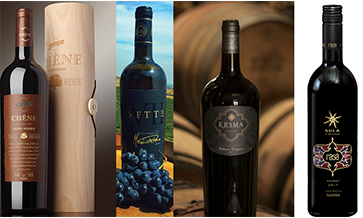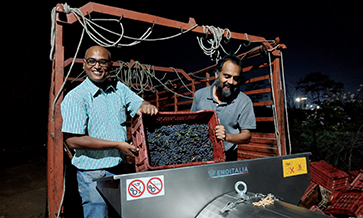Non-Bordeaux grapes in their wines?
A small French revolution in wine is taking shape. In Bordeaux, the world’s most famous wine region, the two biggest appellations – Bordeaux and Bordeaux Superieur – were recently granted permission by the French government to do something that, until recently, was unthinkable.
They will be permitted to use non-Bordeaux grapes in their wines! The idea is not to infringe on the identity or sovereignty of any other wine region, reports The Washington Post.
Wine growers around the world have been seeing the effects of a warming globe for years. Warmer, shorter growing seasons risk higher sugars, and therefore alcohol, but lower development of aromas and flavours. Vintners are already responding by using more cabernet sauvignon and cabernet franc in their blends.
There will be strict conditions for their use. Each property will be limited to growing the new grapes in just 5% of its vineyards. At any given wine, the new varieties won’t be permitted in more than 10% of the blend.
The grapes won’t be listed on the labels, a decision possibly aimed at preserving the identity of Bordeaux as it tentatively accepts “outsiders”. This comes just as more Bordeaux bottles have listed the traditional varieties like Cabernet, Merlot, and Sauvignon Blanc in recent years, making it easier for consumers to know what they’re drinking.
The new blueprint also includes an environmental component, aimed in part in cutting back on still widely used chemical treatments. Weed killers will no longer be permitted between vineyard rows, though they will still be allowed between the vines themselves.
Recreating warming in Germany
The effects of climate change are being felt in just about every wine region worldwide. But it’s not just increasing global temperatures winemakers should be worried about. Radical experiments are beginning to show how increasing carbon dioxide (CO2) levels are also having a profound impact on vineyards and grapevines.
A report in Quartz states that researchers at Germany’s Hochschule Geisenheim University spent several years simulating the effects of increased CO2 levels in a Rheingau vineyard, and they’re starting to reveal their findings.
To simulate future conditions, scientists at Hochschule University built a complex system of six ventilators, three of which blow CO2 onto rows of Riesling and Cabernet Sauvignon grapevines, while the other three blow out normal air. The researchers then raised the concentration of CO2 in the vineyard by approximately 20% to reach the levels expected to occur worldwide by the year 2050.
Some important observations: the additional CO2 seems to develop extra sugar in grapes, making them bigger and juicier; and grape bunches are growing longer, and contain more berries; moths that live in the vineyard are reproducing faster, resulting in more grape-eating larvae for growers to fight. If these experiments are any indication, winemakers in the next 30 years will have to adapt to dramatically changing vineyard conditions in order to remain operational.
Kilbeggan revives 100-year-old whisky
The Kilbeggan Distilling Company recently celebrated the limited-edition release of Kilbeggan Small Batch Rye, the only modern Irish whisky of record to feature such a high quantity of rye within its mash. It is the first whiskey 100% distilled and matured at the Kilbeggan Distillery to be released since its restoration was completed in 2010.
Featuring a mash of malt, barley and approximately 30% rye, this whisky hearkens back to the late-1800s, when many large Irish distillers used rye in their mashes. However, this spicy grain virtually disappeared from the Irish whisky category around the time of Prohibition and the Irish War of Independence.
Double distilled to 86 proof in Kilbeggan’s copper pot stills – one of which is the oldest working whiskey pot still in the world today – Kilbeggan Small Batch Rye is the first of its kind in today’s market. The combination of rye, malt and barley produces an oily, viscous, creamy whisky, bristling with rye and barley spice.

Louis XIII Cognac has a ‘smart’ decanter
Louis XIII has taken a step into the future by integrating NFC (near field communication) technology into its “smart” decanter to provide clients a seamless access to an exclusive world of privileges. Each decanter will directly connect clients to the Louis XIII Society, a private club where members can enjoy exclusive content, unique experiences and personalised services through their smart phones.
A small NFC chip is integrated in the cork stopper of the decanter. After removing the seal, clients will simply have to tap and scan their NFC-enabled smart phones on the cork stopper to access the Louis XIII Society. The private club offers customised decanter engraving, pre-releases of limited editions, and contact with a Louis XIII personal advisor for private tastings and ultimate experiences.

Diageo opens Roe & Co distillery
The legendary Roe & Co. whisky distillery in Dublin re-opened its doors to the public recently. After Diageo bought the former Guinness power station, the distillery has had a €25-million facelift in recent years to get it back to its former glory.
This latest distillery continues the rebirth of what was once known the world over as ‘The Golden Triangle’. It was an area of Dublin less than a mile in size that had hundreds of distilleries producing the finest pot still whisky in the world.
Roe & Co. currently produces whisky by blending whiskys sourced from third parties. It will have to wait 3 years to release whisky distilled on site. Roe & Co. is the latest distillery to open in the area after Teeling Whisky opened in Newmarket, Pearse Lyons Distillery and The Liberties Distillery.
Diageo is expecting the distillery to be popular with tourists, in particular, North Americans, Britons and continental Europeans.

Champagne with a cosmic connect
Biodynamic wine producer Leclerc Briant is launching the world’s first-ever wine fermented and aged in a gold barrel in 2021. The specially-designed barrel is made with stainless steel and lined with 24-carat gold. The barrel’s capacity is 228 litres and is currently holding wine from the 2016 vintage, made with grapes from its biodynamically-farmed La Croisette vineyard.
The gold in the barrel “makes a connection with cosmic activity,” an important part of biodynamic principles. The Campagne house said the wine stored in the gold-coated barrel tasted “completely different” from others made from the same plot, but fermented and aged in other vessels.
“People might think that such experimentation is stupid, but by chance, we have a crazy idea that appears to be making a powerful improvement to the process,” the company said. “We are here to make a great wine, and for that, you must experiment, and try to understand how nature works.”
Brown-Forman to acquire Fords gin
Brown-Forman Corporation has announced it has reached a definitive agreement to purchase The 86 Company, adding Fords Gin, a premium gin, to its growing portfolio.
A mix of nine botanicals, Fords Gin starts with a traditional base of juniper and coriander seed balanced by citrus, florals and spices. Steeped for 15 hours before distillation, the botanicals deliver an aromatic, fresh and floral spirit with elegant notes of jasmine and grapefruit.
Fords Gin is a collaboration between Simon Ford and eighth-generation Master Distiller Charles Maxwell of Thames Distillers. Simon Ford and The 86 Company team will remain a key part of the building and crafting of Fords Gin going forward.














